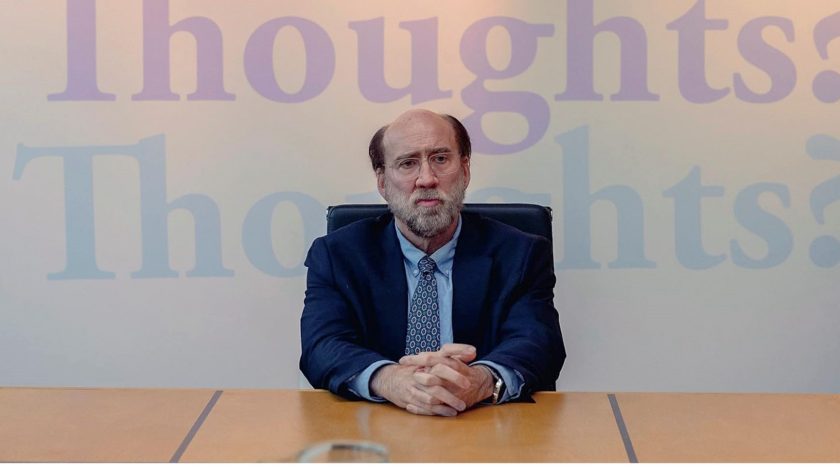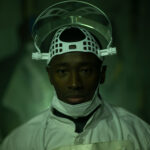Less than a year after his sophomore feature Sick of Myself, Norwegian filmmaker Kristoffer Borgli boldly returns with a surreal portrait of what it entails to become an overnight sensation.
There’s something strange about Dream Scenario, something that doesn’t feel right. Like a fever dream you can’t wake up from. But this new addition to A24’s long lineage of unique storytelling is also surprisingly moving, and even hilarious.
It’s no news that Borgli’s filmography has always been concerned with the digital age and our contemporary society. His debut work Drib (2017), a hybrid fiction/documentary, was a dramatic retelling of his friend’s rise to fame as he scammed his way into becoming the face of an energy drink brand. Sick of Myself (2022), which screened at last year’s Cannes Un Certain Regard, satirised the depravity of our relationship with social media and this generation’s insatiable desire for attention. Set within Olso’s lavish elite, the body-horror dark comedy followed the tale of two narcissists and their synergetic performative tendencies to attract recognition and sympathy.
Premiering at TIFF 2023, Dream Scenario, which clearly draws inspiration from the director’s previous films and subjects, feels like his most complete work to date. While Sick of Myself examined how far someone would go for attention, this film on the other hand subverts that idea and inexplicably hands our lead worldwide attention without him asking. How do you deal with such unprecedented fame? What advantages does this allow? But also, what are the downsides, the dangers even? Why is this happening?
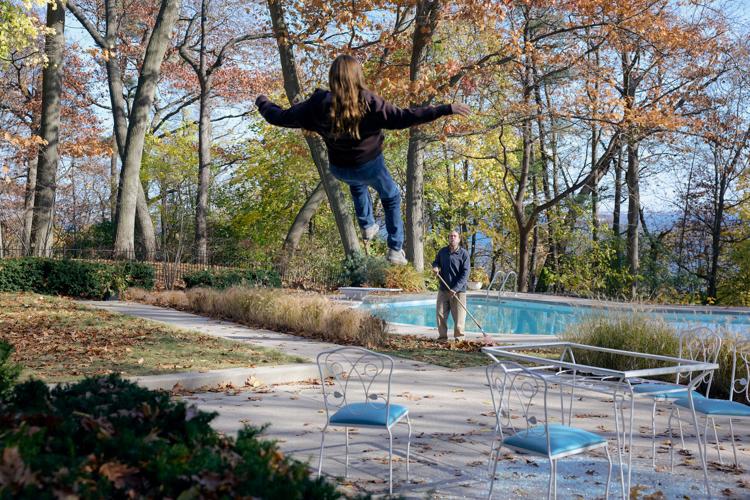
Enough beating around the bush, Dream Scenario tells the absurd story of your average-looking middle-aged father who one day, for no apparent reason, starts appearing in people’s dreams around the world. Right off the bat, what a brilliant, unique yet simple premise for a story. As unbelievable as it sounds, the film quickly nudges you to disregard the logistics of this phenomenon and why it is happening because, ultimately, that’s not really the point. Other than brief exposition shown on the news with possible theories including astral projections or one big collective Mandela Effect, the film rightfully chooses to brush over this and continue on its wave of surrealism which, in some cases, might rub viewers the wrong way. In the same vein as Sick of Myself, the level of absurdity in Dream Scenario exceeds off of the screen and, on a different scale, the film pushes it to an even higher degree. Kristoffer Borgli’s style and vision here will inevitably be compared to Charlie Kaufman, whose work famously conceptualises the subconscious, the surreal, and our existentialism as a vehicle for humanity. With Borgli also as the screenwriter, the mere idea of conceiving a story tackling dreams allows him unlimited creative freedom to explore the subconscious intertwining with our reality. At once funny, scary, ludicrous, confusing, touching, and visually striking, Borgli’s improbable scenarios, both in dreams and our waking life, display an array of emotions and tones.
It’s impossible to talk about Dream Scenario without acknowledging Nicolas Cage’s spot-on casting as Paul. Famously known for his eccentric performances and for choosing relatively ‘bad’ films in the past due to financial problems, the legendary Hollywood actor works perfectly here as he plays a hapless, defeated college professor whose writing career never really took off. Living a modest life with his wife and two daughters, Paul’s serenity is radically shaken by this strange epidemic that finds him at the center of a viral media frenzy, all of a sudden appearing on news reports, interviews, and social media trends. Other than the guilty pleasure of receiving all this attention for once, it also presents Paul with the occasion to finally obtain a publisher for his book. But like a deer in headlights, he is rapidly approached by hungry companies who, claiming friendly collaboration, are ready to exploit and feast on his new-found fame. Both neurotic and poised, Cage’s physical ability to look painfully typical and pitiful but suddenly threatening and off-putting is remarkable. His reputation for giving ‘memeable’ performances, which have gone viral multiple times, suits Paul appropriately as his character can be agonizingly cringe-inducing but all the more ridiculously funny. Kristoffer Borgli notes that once Nicolas Cage was on board for the casting, the film “took on this meta layer of having an impossibly famous person playing an unremarkable everyman”. Having already starred in the hyper-self-aware, loosely auto-biographical comedy The Unbearable Weight of Massive Talent (2022), his performance in Dream Scenario feels like the culmination and epitome of his career, which ultimately comes off more as a tribute to his reputation and a hilarious way to clap back at it.
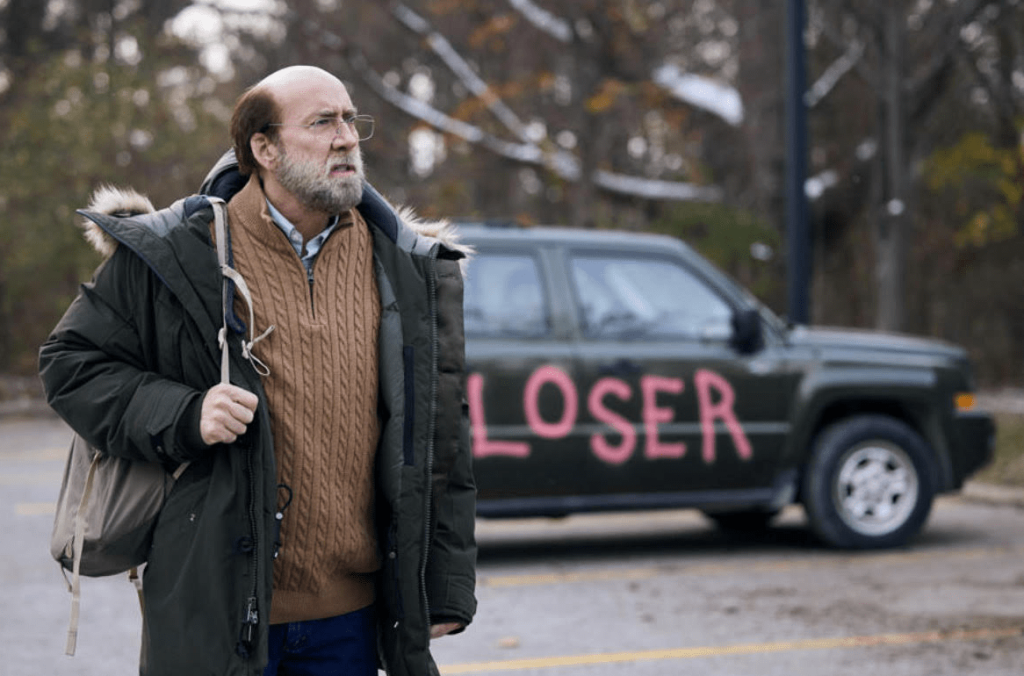
You can sense Ari Aster’s fingerprints all over Dream Scenario. Considering the film’s dark turn of events midway through, it comes as little to no surprise when the A24 God of Horror is listed as a producer in the ending credits. Indeed, while Paul’s presence in people’s dreams is only passive initially– whether he’s passing by or simply watching from afar like a background extra –he suddenly becomes more involved in them as the dreams grow increasingly nightmarish. What first starts as a novelty, then a blessing, soon becomes a literal nightmare. Aster’s renowned mastery for disturbing audiences is extremely effective here, where his sick and twisted mind comes in very handy when depicting the darker sides of fame. Specifically, Dream Scenario features one of the most uncomfortable and downright bizarre sex scenes in recent memory. Simultaneously ridiculous and perverted, the moment still serves as an unsettling but interesting take on the duality between fantasized expectations and reality.
There’s also something strange about the film’s overall stylism and unorthodox filmmaking. It feels as if the dream-like state of the scenarios had slowly infiltrated the film’s lucid reality, translating through erratic editing and camerawork, and unconventional sound design. If you look closely at some of the scenes taking place in the real world, you’ll notice odd things in the background like snow rising up to the sky, or a student frantically scribbling something on their paper without looking at it. Are these simply meteorological coincidences and poorly managed background actors, or intentional elements that build layers to the film’s reality? Whatever it is, it certainly adds some ambiguity and enigma to the story.
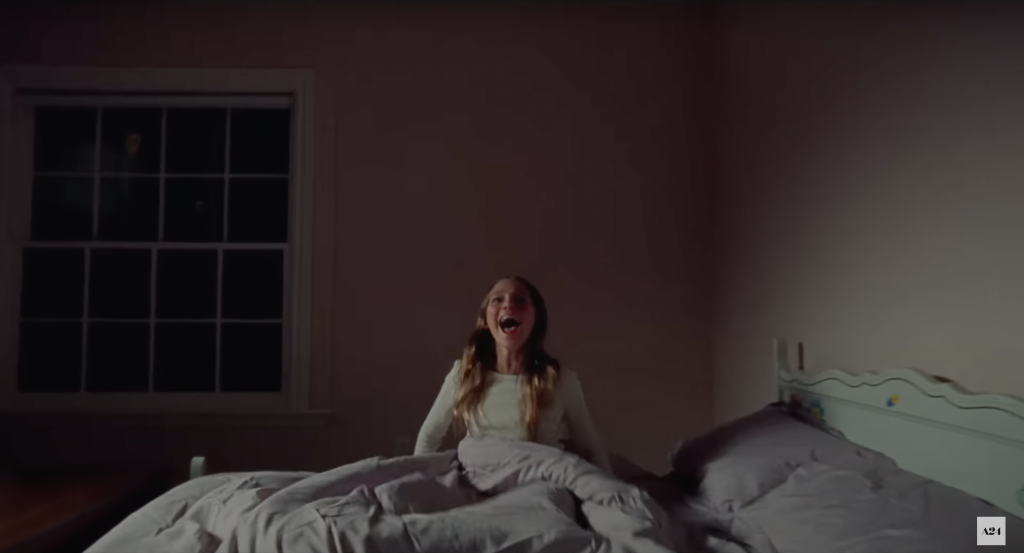
Dream Scenario does everything you could imagine with its premise. From exploring cancel culture to mob mentality and the subconscious, Kristoffer Borgli’s fable is delightfully tragic and will inevitably make you cringe with its burlesque scenarios. While it struggles to bite off more than it can chew in its almost Black Mirror-esque climax, the level of absurdity to that point is already turned so high up that ultimately, it’s forgivable. Both a commentary on pop culture’s fickle whims and its manufacturing of ephemeral spectacles (anyone nowadays is at risk), Dream Scenario paints a picture of the emotional roller-coaster that is virality and, although slightly shallow, the effects it has on private relationships. But Borgli’s and Aster’s pairing is a match made in heaven (or should I say a dream), where their respective prowess in social satire and disturbing imagery mingle to create a thought-provoking, peculiar, and uncomfortably funny experience that borders on the uncanny, accompanied by some surprise cameos.
Watch the official trailer for Dream Scenario here:

